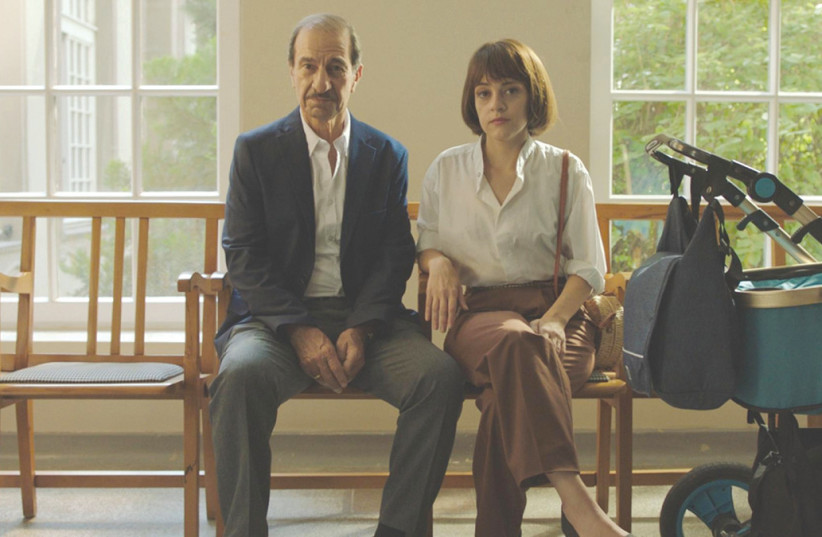Sasson Gabay, who stars in Eitan Green’s latest movie, My Daughter My Love, which opened in theaters around Israel on February 22, proves once again that he is not only one of Israel’s greatest actors but one of the best actors anywhere in the world.
Gabay began to receive the recognition he deserved relatively late in his career. Like many Mizrahi actors – Gabay was born in Baghdad – early on, he often played Arab terrorists and cops but gradually moved into more interesting roles.
When he starred in Eran Kolirin’s 2007 The Band’s Visit, as an Egyptian musician lost in Israel, he connected with audiences around the world and even reprised the role in the Broadway musical adapted from the film. But the truth is that as good as he is, he has rarely had a role where he was the central character in a film.
Part of it is just the luck of the draw, and a high percentage of Israeli movies tend to focus on a large group of characters. He has always been a key part of the ensembles in which he has performed, and in such movies as Moshe Rosenthal’s Karaoke and Avi Nesher’s The Other Story, he got to deliver many of these movie’s best lines and was a critical part of their most interesting scenes.
But with My Daughter My Love, he has the leading role he deserves in a complex, moving story of a father trying to help his troubled daughter. It’s also a movie with occasional comic moments, and, like most great actors, he has a flair for comedy as well as for drama.

The plot
In My Daughter My Love he plays Shimon, a 70-year-old widower and businessman who comes to Paris to spend time with his daughter, Alma (Sivan Levy), who is studying animation there. Alma lives with her husband, Dori (Ido Bartal), a graduate student, and their baby. Shimon also plans to visit his old buddy, Nissim (Albert Iluz) and his wife, Vivi (Evelin Hagoel). It sounds like a dream vacation, but almost as soon as he arrives, it becomes clear that something is off with Alma.
She’s not sleeping, and not only because her baby wakes her up, and she is distracted. Dori, a graduate student, is spending as much time as he can away from the apartment. Alma won’t open up to her father, and Shimon, who is sweet but old-school and not especially astute in dealing with emotion, finds himself confused and worried. Thinking that the problem is likely to be that Dori is cheating on her, Shimon follows Dori around the city, often with Nissim and Vivi – who, unlike Shimon, think they know everything about how he should handle the situation – in tow, in scenes that are often surprisingly funny.
But the problems in his daughter’s marriage are not as simple, or as easily fixed as Shimon thinks at first, and Alma seems to have serious issues that transcend any marital woes. Since the movie is constructed so that Alma’s character and her challenges are revealed gradually, I won’t reveal anything here that could be seen as a spoiler. But toward the end, and in spite of Gabay’s spot-on performance, the movie becomes a bit muddled, as it isn’t clear whether this is a story about a father coping with a daughter’s mental illness that is coming to the surface or a fleeting post-partum depression that expresses itself in an unusual way.
There are also themes in the film that have to do with the ways that it is difficult for Alma to see her father moving on with a new woman following her mother’s death; as well as some drama about artistic fulfillment; and how Shimon put his own dreams of being an artist on hold, while Alma is struggling to realize hers.
But at its core, this is a movie about the tragic fact that even the deepest paternal love can’t heal all wounds. At times, it seems as if Green wants to find a way for Shimon to solve everything – just as the character wants to – and risks oversimplifying messy truths about the human psyche.
Green has made a number of well-regarded movies, many of which have focused on troubled families, particularly fathers and their relationships with their children, like his previous film, Indoors, about a contractor who gets into deep financial trouble as he tries to make a good life for his son. The director’s affection for Shimon shines through in every scene, but he is more hesitant in how he wants to present Alma, who is a bit of a cipher in spite of Levy’s emotionally realistic performance. Iluz and Hagoel are very entertaining as Shimon’s nudnik but lovable friends.
The movie is at its best as it presents Shimon’s befuddlement over the fact that all is not perfect for his daughter during the often sentimentalized but sometimes very difficult experience of new motherhood. So many families go through trying times when there is a new baby, and the burden of having to project a perfect façade to the world can increase the pressure, as it clearly does with Alma.
Gabay is the perfect actor to portray a father’s frustration that he cannot do more to make everything right for her and his performance is so strong, it smooths over occasional weaknesses in the plot.
